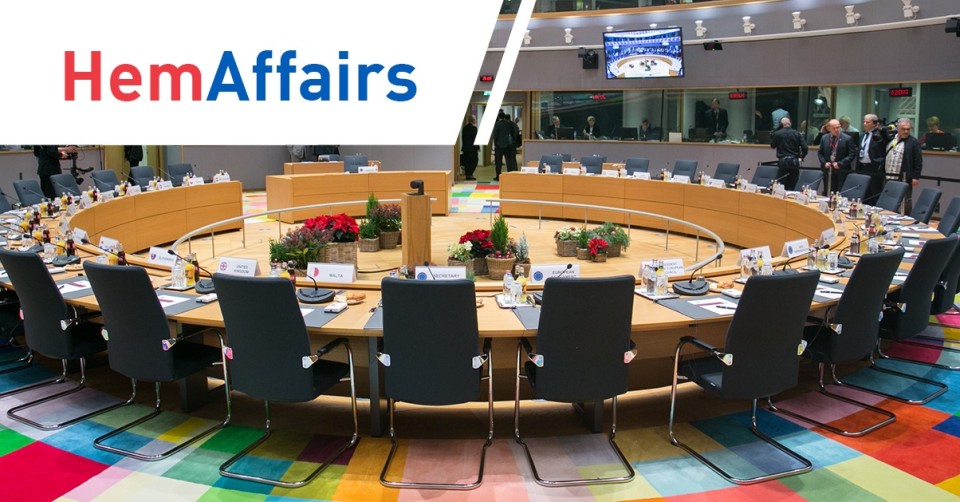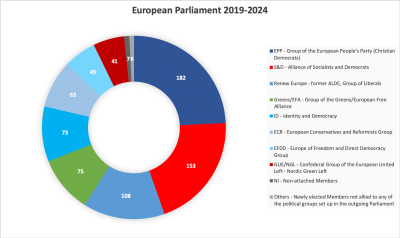This information originally appeared on the previous EHA website. Links to other pages may be inactive.

HemAffairs Article #1 – June 2019
2019 will see significant changes within the European institutions. The first already took place in late May, as 50% of EU citizens – the highest turnout since 1994 – went to the ballot box to elect their Members of the European Parliament (MEPs). The result: Confirmation that nationalism and Euroscepticism are on the rise, and a set-back of center political parties. What does this mean for decision-making in the EU and how will this affect EU health policies?
Bracing ourselves for tougher compromises
The outcome of the European Parliament elections confirmed trends observed across many a Member State: First, traditional and moderate political parties (center-right and center-left) are dwindling. Second, nationalists and Eurosceptics keep on attracting a growing share of the electorate. Third, citizen engagement and interest are shifting from European to national, even local, level.
Conservatives (the European People’s Party, EPP) and social democrats (S&D) no longer hold the majority of seats, which means that for any text to pass through the European Parliament a coalition will have to be built from scratch, with alliances shifting from one topic to the next. The new dynamics will affect the decision-making process and may make it more difficult to reach compromises on health-related measures. This will require stakeholders such as EHA to dedicate more efforts to influencing alliances between political groups to support amendments to pieces of legislation in line with the position of the hematology community.

Playing with numbers
Just over a third of MEPs have been re-elected, while 481 new faces were present at the first plenary session of the new European Parliament on July 2, 2019. The same ratio holds for the Parliament’s Environment, Public Health and Food Safety Committee – aka ENVI Committee, where several MEPs with a strong interest in health failed to secure citizens’ support for another term. The question is then: What will become of pending health files?
For instance, political negotiations are still open on the proposal for a regulation on Health Technology Assessment (HTA). However, many of the MEPs involved in the inter-institutional discussions for the past two years are no longer in place, including the rapporteur, former MEP Soledad Cabezón Ruiz. A new rapporteur thus needs to be appointed to take over the negotiations with the Council of the EU in view of a compromise agreement. Who will take the lead? Will incoming ENVI MEPs take the same stance as their predecessors?
New MEPs and health
The heterogenous composition of the new Parliament presents numerous challenges and opportunities for health policy. Some challenges are a direct consequence of the wave of national populism. To start with, growing discontent towards what is perceived as EU-centric policymaking, disconnected from national and regional reality, will inspire some to impede ambitious EU initiatives.
In addition, science naysayers are becoming more vocal, questioning the impartiality and benefits of medicine and technology. Anti-vaccine supporters are symptomatic of such distrust towards science. This type of discourse is getting more traction amongst populists and is expected to slow down – but not hamper – discussions about health policy and technology.
At the same time, the election of Italian socialist MEP, David-Maria Sassoli, as president of the European Parliament is encouraging news. Moreover, the Greens are keen on a more active EU role in health. Having picked up 15 seats compared to the previous European Parliament, their influence and relevance to stakeholders such as EHA is increasing.
Beyond the European Parliament: What can we expect for the EU Health Policy?
Health policy will undoubtedly remain the prerogative of Member States. Nonetheless, the EU may actively push for more harmonization. To what extent? That decision belongs to the President of the European Commission and her team.
The European Parliament’s endorsement of Ursula von der Leyen for the job comes as positive news. With a medical background and years of experience as a gynecologist, one can only hope for her engagement for stronger EU health policy. What will be her ambitions in that regard for 2019-2024? Will it support more R&D in health? EHA will keep a close eye on EU politics as answers to those questions are expected over the coming months.